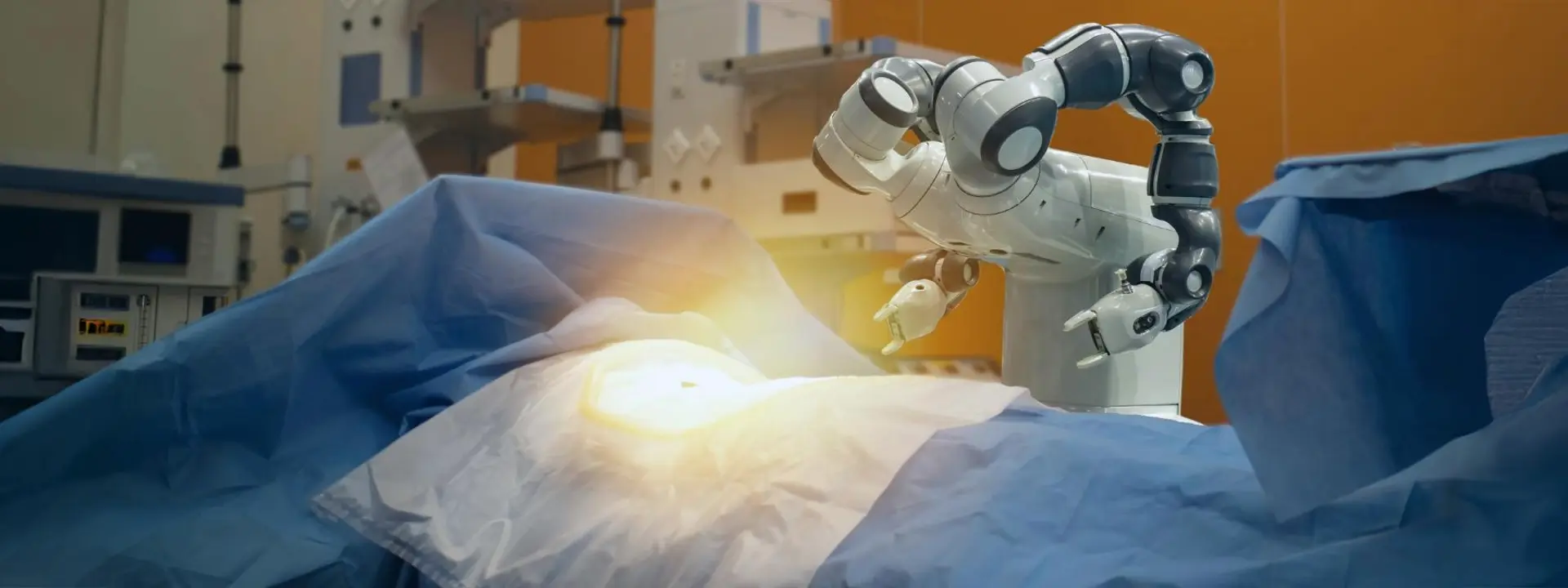How engineering is transforming robot-assisted cancer surgery

At Heriot-Watt, innovation is at the heart of improving healthcare. One of our research projects, led by Dr Yuhang Chen, aims to revolutionise cancer surgery using engineering, sensing technologies, and artificial intelligence (AI).
Robot-assisted surgery has already transformed operating theatres, enabling minimally invasive procedures that require miniscule incisions. However, this new project takes the technology even further, developing tools that help surgeons assess tissue conditions and determine surgical margins with greater precision.
The challenge: precision in cancer surgery
When removing a tumour, surgeons must determine the size of the “surgical margin”—the surrounding healthy tissue removed alongside the tumour to ensure no cancer cells are left behind. Too much removed, and the patient may suffer unnecessary pain, experience longer recovery times or result in loss of functional tissue. Too little, and there’s a higher risk of cancer recurrence.
Traditionally, surgeons have relied on their sense of touch and decades of experience to guide these decisions during open surgery. However, keyhole or laparoscopic surgery—where small cameras and slender tools are used through tiny incisions—removes this important tactile feedback. This makes it harder for surgeons to assess the condition of tissue in real time.
The solution: engineering the future of surgery
Dr Chen’s team are developing a specialised probe that will augment a surgeon’s sense of touch during keyhole surgery. Using mechanical sensing and computer vision, the probe is designed to operate in the confined spaces of laparoscopic surgery. It can take mechanical measurements of the tumour and surrounding tissue, providing surgeons with real-time, quantitative data about tissue conditions.
The device integrates advanced hardware with intelligent software algorithms to compare live data with information from previous surgeries. This “mechanical intelligence” will help surgeons make more informed decisions about optimal surgical margins.
Collaboration is key
This project brings together expertise from academics, clinicians, and industry leaders to create these new innovative solutions. Consultants like Hugh Paterson from the Western General Hospital in Edinburgh and urological surgeon Daniel Good have provided invaluable insights from their years of surgical experience. On the industrial side, IntelliPalp Dx—a spinout company from Heriot-Watt University and NHS Lothian—offers expertise in diagnostic tools, while CMR Surgical contributes its state-of-the-art Versius robotic surgery system.
The project, supported by a £1.25 million grant from the Engineering & Physical Sciences Research Council, exemplifies the power of interdisciplinary collaboration.
Transforming cancer surgery and beyond
The potential impact of this project is profound. By pairing the new probe with robotic systems, surgeons can gain unprecedented real-time insights into tissue conditions and surgical margins. This innovation could enhance precision, reduce recovery times, and improve outcomes for cancer patients.
The implications of this research extend far beyond cancer surgery. The integration of advanced sensing technologies and AI into robotic systems has the potential to transform a wide range of medical procedures, from diagnosing complex conditions to performing intricate surgeries in other specialties. By setting new benchmarks for precision and decision-making in minimally invasive treatments, this project represents a paradigm shift in the use of engineering to solve some of healthcare’s most pressing challenges. Dr Chen’s work not only improves outcomes for individual patients but also contributes to the evolution of robotics and AI as indispensable tools in the operating theatre of the future.
This research is part of the cutting-edge collaborative work taking place at the National Robotarium and the Global Research Institute in Health and Care Technologies at Heriot-Watt University.
About the researcher
Dr Yuhang Chen is a leading researcher at Heriot-Watt University specialising in robotics, automation, and advanced manufacturing technologies. With a strong focus on healthcare applications, Dr Chen is at the forefront of transforming robot-assisted cancer surgery, pioneering innovative techniques to enhance precision, efficiency, and patient outcomes. His interdisciplinary work bridges engineering and medicine, exploring novel robotic solutions that address critical challenges in minimally invasive procedures. Dr Chen’s research is supported by collaborations with industry partners, clinicians, and academic peers, positioning him as a key contributor to the advancement of surgical robotics. Passionate about improving lives through technology, Dr Chen’s work exemplifies Heriot-Watt’s commitment to impactful, future-focused research in health and care innovation.
Find out more about our work in Health and Care Technologies.